Vietnam sends seeds into space
Vietnam has successfully sent flower seeds into space for scientific research.
Vietnam has successfully sent flower seeds into space for scientific research.
The project, "Space seeds for Asian Future 2010-11 (SSAF 2010-11) " was organised in cooperation with space and scientific agencies from Malaysia , Japan , Indonesia , Thailand and Vietnam .
The seeds of three species of flowers were carefully selected by Professor Duong Tan Nhut, a leading expert in flower research in Vietnam , and then sent to Japan to be processed before they were sent into space.
The species of flower seeds that made the trip are ‘pure' Vietnamese and were selected because of the relatively short period the flowers require in order to blossom.
"If there are any changes or mutations that occur it should be easily noticed after these seeds return to Earth," said Nhut.
Together with plant seeds from other partnering countries, the seeds were successfully carried by a Japanese missile on January 22 to "KIBO," one of the key components of the International Space Station (ISS).
The seeds will be retrieved in the middle of April by Space Shuttle Endeavour, said Dr Nhut.
Nguyen Huu Diep, from Space Institute said during the two-month-tenure in space, these seeds would be tested for their ability to survive space conditions including radiation rays, temparatures extremes and the void of gravity.
After returning to Earth, the seeds will be studied to see if any gene mutations or sprouting occurred during their tenure in space. This is the first time Vietnam has carried out such research.
In Vietnam , the programme is being managed by the Vietnam Academy of Science and Technology and the Central Highlands Institute for Biology.
The programme hopes that the results of the experiment will inspire students across Asia and help them have new perspective about space science and boost interest in science.
The project is being funded by Japanese investors. Japan is one of the few countries that have invested in intensive research concerning flora and fauna mutation./.
The project, "Space seeds for Asian Future 2010-11 (SSAF 2010-11) " was organised in cooperation with space and scientific agencies from Malaysia , Japan , Indonesia , Thailand and Vietnam .
The seeds of three species of flowers were carefully selected by Professor Duong Tan Nhut, a leading expert in flower research in Vietnam , and then sent to Japan to be processed before they were sent into space.
The species of flower seeds that made the trip are ‘pure' Vietnamese and were selected because of the relatively short period the flowers require in order to blossom.
"If there are any changes or mutations that occur it should be easily noticed after these seeds return to Earth," said Nhut.
Together with plant seeds from other partnering countries, the seeds were successfully carried by a Japanese missile on January 22 to "KIBO," one of the key components of the International Space Station (ISS).
The seeds will be retrieved in the middle of April by Space Shuttle Endeavour, said Dr Nhut.
Nguyen Huu Diep, from Space Institute said during the two-month-tenure in space, these seeds would be tested for their ability to survive space conditions including radiation rays, temparatures extremes and the void of gravity.
After returning to Earth, the seeds will be studied to see if any gene mutations or sprouting occurred during their tenure in space. This is the first time Vietnam has carried out such research.
In Vietnam , the programme is being managed by the Vietnam Academy of Science and Technology and the Central Highlands Institute for Biology.
The programme hopes that the results of the experiment will inspire students across Asia and help them have new perspective about space science and boost interest in science.
The project is being funded by Japanese investors. Japan is one of the few countries that have invested in intensive research concerning flora and fauna mutation./.













